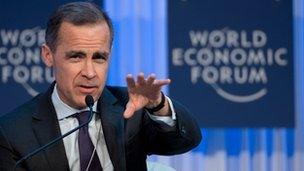Davos 2013: A 'sigh of relief' at the World Economic Forum
- Published

Mark Carney disagreed with OECD chief Angel Gurria that monetary policy was "maxed out"
The need to avoid complacency is a regular theme at every Davos meeting - but this was the first in five years that there seemed a genuine risk of it breaking out.
As Mark Carney - our soon-to-be Bank of England governor - joked at the traditional session on the global economy on the final day, he arrived on Thursday to find people saying the "tail risk" in the global financial system had been reduced. By Friday night it had been "eliminated".
The Financial Times's Martin Wolf said it would go down as the "sigh of relief Davos". The collapse of the euro now looks much less likely. A hard landing in China, or debt crisis in the US, also look more distant.
The optimism is not hard to miss in the stock markets, the US especially. The S&P 500 closed above 1,500 points on Friday for the first time since 2007, after the 8th consecutive day of gains. That's the longest winning streak since 2004. And the FT's "all-world" index is the highest it has been in 20 months.
There was also that good news from the European Central Bank this week, announcing that a good chunk of the emergency lending it had offered to European banks in the dark days of the eurozone crisis just over a year ago was being repaid early.
Disconnect
Of course, the big wrinkle in the relief scenario is that the feel-good factor in the financial markets has yet to filter through to the real economy, or do it very much good.
I wrote about this at length in my first blog from this year's Davos. But Friday provided an even more vivid demonstration of the disconnect between those two things in the UK.
This was the day it was announced that the UK economy had shrunk by 0.3% in the last three months of 2012, yet the FTSE 100 closed at a four-and-a-half-year high, having had the best start to the year in two decades.
International Monetary Fund managing director Christine Lagarde said that Europe needed a plan for growth - short and long term. It wasn't enough, she said, paraphrasing Chancellor Angela Merkel, to say "we have solved all of our economic problems, now we just have to wait seven years to see the effects".
Mr Carney insisted that central banks couldn't get rid of all the "tail risks" still lurking inside the system. Everyone - including governments - had to finish what they had started for that to happen, including financial reforms.
'Escape velocity'
Though understandably coy on the subject of monetary policy, Mr Carney did say central banks had to finish what they had started as well, and make sure that the major economies achieved "escape velocity". That is, a recovery that is not constantly at risk of stalling. (He used this term from physics - much loved inside the Bank of England - quite a lot. Maybe he will fit right in, after all.)
Most important, for UK purposes, Mr Carney made a point of disagreeing with the OECD's secretary general, Angel Gurria, that monetary policy was "maxed out". Mr Carney said there was room "within the framework of flexible inflation targeting that exists in most advanced economies", for central banks to achieve monetary stability over the appropriate horizon.
He also said it was OK for countries that were above target to take a while to get back down to it, if the domestic recovery was facing fiscal and other headwinds.
Precisely what "flexible inflation targeting" can and should mean is, of course, the great subject of the moment among UK monetary policy nerds (and plenty of economic journalists) as we eagerly await the arrival of the new UK bank governor.
Sir Mervyn King , external, which, in turn, was a response to one given last year by Mr Carney.
What the new governor would like it to mean in practice in the UK we will wait to find out.